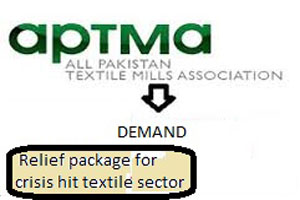
APTMA demands relief package for crisis hit textile sector
YarnsandFibers News Bureau 2017-06-19 13:00:00 – PeshawarAll Pakistan Textile Mills Association (APTMA), Khyber Pakhtunkhwa zone, has called for announcement of relief package for the crisis-hit textile sector before the federal budget 2017-18.
Speaking at a press conference at APTMA House on Saturday, Taimoor Shah, Chairman, Khyber Pakhtunkhwa zone of the association, said that Federal Minister for Finance Ishaq Dar had committed the allocation of Rs180 billion for the prime minister’s export-led growth package for payments of drawbacks on taxes to exporters on realisation of export proceeds. But, in the budget, he announced a meager amount of only Rs4 billion.
Refund cases of millions of rupees of the textile sector were struck off, despite that the government imposed new taxes and surcharges on them, which was badly affecting the industry. He demanded clearance of all pending sales tax refunds by July 2017 and immediate withdrawal of customs duty and sales tax re-imposed on cotton import.
Taimoor Shah also called for making indirect exports eligible under LTFF scheme and allowing the utilisation of the facility for building infrastructure for garment plants.
The APTMA’s KP chapter was also critical of high prices of utilities and wages as compared to their competitors in India, Bangladesh and Vietnam, thus increasing the cost of production in Pakistan. As compared to India, Bangladesh and Vietnam where the price of gas was Rs400 MMBTU; it was supplied to textile industry in Pakistan at Rs600 MMBTU, while the imposition of GIDC had further multiplied their woes.
Expressing concern over the growing electricity tariff, Taimoor Shah said that the rate of electricity during previous government was Rs7 per unit, which had now reached to Rs13 per unit irrespective of record decline in oil prices in world market. In such a situation, how they could compete in the international market, he lamented.
Similarly, in the Finance Bill 2017, the government also increased the rate of minimum turnover tax under section 113 of the Income Tax He called for reducing the tax to 0.25 percent to improve liquidity of loss making textile industry.
Imposition of further tax at 1percent on supplies to unregistered persons had caused multiplier effect on the disintegrated textile value chain. Therefore, demanded exemption of five exporting zero rated sectors from the levy of further tax to reduce cost of doing business.
Market Intelligence
Ask for free sample Report

experience
Customer Base
dedicated team
Countries Served Worldwide









